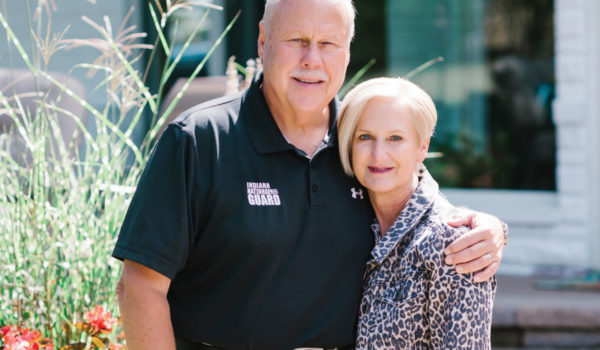
by Glenda Winders // photography by Stacy Able
Marty Umbarger has answered the call of the land and of his country
Gen. R. Martin Umbarger — who would rather you call him Marty — credits his late parents with giving him two bits of advice that charted the course of his life. His father told him to enlist in the Indiana National Guard, and his mother told him to be sure of what he was doing when he married his wife, Rowana. The two sets of parents were friends, and she said she’d never forgive him if he did anything to damage that relationship.
He and Rowana both grew up in Bargersville and graduated from Center Grove High School, but since they were six years apart in age, they didn’t really know one another.
“Our families did a lot of things together,” Marty says, “so I knew her growing up, but just as my good friend’s little sister.”
After graduation in 1965, Marty went to college at the University of Evansville, where he played football and graduated in 1969. He came back home to join his father in the family business, Roy Umbarger and Sons Agribusiness, but the Vietnam War was underway. That’s when his dad, a World War II Navy veteran, asked how he planned to fulfill his military obligation and made his auspicious suggestion.
Although the waiting list to get into the National Guard was long, the enlisting sergeant said that since Marty was a college graduate he could join up immediately if he would agree to go to Officer Candidate School. He went to Fort Ord, California, for basic training and discovered that he so enjoyed being a regular soldier in a platoon that he told his superiors he wouldn’t be going to OCS after all.
When day after day he found himself on KP duty, he approached the assigning sergeant to ask what was up. The sergeant responded by asking him if he would rather peel potatoes or go to OCS; off he went. When Marty retired as a major general some 45 years later, that sergeant’s daughter would see an article about him in the newspaper and arrange a phone call between the two men.
“I told him I was sure glad he had me peeling potatoes,” Marty says.
Soldiering on
After his training Marty was working at the feed mill one day when Rowana delivered several loads of corn from her family’s farm, and he took notice. They began dating a year later, and when their relationship became serious his mother issued her warning. They dated for two more years before marrying, but her cautionary advice wasn’t the only reason. Each had been married before, and they wanted to be sure it would work this time.
They celebrated their 36th anniversary in July.
Meanwhile Marty’s military career was on the ascent. He worked up through the ranks and was a brigadier general on Sept. 11, 2001, when he got a call from the Pentagon requesting that he come to the U.S. Army Forces Command at Fort McPherson in Atlanta. He was there for the next 2½ years.
“I went down as the head of mobilization for the National Guard and was a part of all the planning for the whole nation,” he says. “We were putting troops at airports and the borders and getting ready to go to Afghanistan and Iraq.”
He was never deployed to either of those countries, but he traveled to both multiple times to visit soldiers and attend planning meetings. When that assignment ended, the four-star general in Atlanta asked him to stay on, but Indiana Gov. Joe Kernan had a different idea. He wanted Marty to be his adjutant general.
Traditionally that job had been filled by someone in the governor’s own party, so Marty figured his registration as a Republican voter would disqualify him, but Kernan said his decision wasn’t political and he thought Marty was the perfect candidate for the job.
Rowana encouraged him to accept.
“I told him there was a reason he had been asked to do this,” she says, tears still welling up as she remembers the proud moment, “and I thought he was the right person for the job.”
A new post
But Marty had reservations. By this time he and his brother were running the business together, and he didn’t want to let the family down. He asked Kernan for a six-month trial period to see if being Indiana’s top soldier would mesh with his civilian work. When Kernan later asked how the business was doing, he responded, “Well, Governor, I found out I wasn’t quite as important as I thought I was.”
When Mitch Daniels became the next governor, he asked Marty to stay on.
“General Marty Umbarger was one of only two officials appointed by my predecessor whom we decided to reappoint,” says Daniels, who is now president of Purdue University. “It was one of the best decisions of my time in elected office.
“General Umbarger served with great honor and effectiveness during the eight most challenging years in the history of the Indiana National Guard. I saw the respect and affection his soldiers and airmen had for him as a combat leader. I saw him work cooperatively with other organizations as we responded to natural disasters. And I saw, at too many funerals, the depth of his concern for his troops and for their families.”
During Marty’s service with Daniels he represented Indiana in Slovakia, Indiana’s partner in the State Partnership Program, which serves to build relationships between the two entities. When Slovakia sent troops into Afghanistan, he returned there to cooperate with them in training the Afghan National Army.
When Mike Pence succeeded Daniels as governor, he asked Marty to stay, too. He did, for 2½ years until he retired in 2015, and then he helped Pence choose his replacement.
The much-decorated soldier credits his wife for always being supportive.
“The whole time I was going up through the ranks, she was always by my side,” he says. “She was active with military families and respected by the soldiers’ spouses. If anyone had issues, she was there to help.”
Looking back over his military service, Marty says he is most proud of the expansion of Camp Atterbury, the creation of the nation’s largest urban training center in Muscatatuck and the Youth Challenge Program that helps high school dropouts get their GEDs and assimilate into society as productive citizens.
Back to the farm
With his military career completed, he returned to the agriculture business, with some changes in place. His son, Jackson, bought his brother’s share of the business and became the fourth generation of Umbargers to be in charge, and Rowana became the company’s chief financial officer. She had attended the University of Indianapolis and worked as a paralegal, and when Marty’s father was ready to give up keeping the books, she was ready to step in. Marty wasn’t so sure.
“At first I said no,” he says. “I didn’t want to do anything to jeopardize our relationship. It wasn’t that she couldn’t do the job, but Mother was very clear. It turned out to be the best move we ever made.”
Home, sweet home
Today they live in a country home that Marty had admired as a child; the home sits off the road among a stand of mature trees. Their yard is huge and colorful, thanks to Rowana’s love of gardening, and she can look out the kitchen window across a field to the farm where she was brought up. They say their first love is their family: Rowana’s parents and the three children and seven grandchildren they share. Their oldest grandson works in the business.
But they have lots more going on, too. The business is currently undergoing its largest expansion since it was established in 1939, and Marty sometimes works as a consultant for defense contractors. He is also the president of the Youth Challenge Foundation of Indiana and on the board of directors for the National Youth Challenge in Washington. He is a trustee at Franklin College, on the Board of Regents at the University of Evansville and vice chairman of the board of trustees at Johnson Memorial Health, which is also in the midst of a significant renovation.
“Marty is committed to making sure that the only full-service hospital located within the county fulfills its obligation to provide high-quality, cost-efficient care to its residents,” says David Dunkle, JMH president and CEO. “He is willing to do whatever he can to help assure the success of this organization. Marty is obviously a proven leader.”
Rowana also feels compelled to give back. For eight years she served on the Bargersville City Council, and she is now on the planning commission and the board of zoning appeals. She’s the chairwoman of the steering committee for 100 Women Who Care.
For pleasure, Marty and Rowana have traveled to several countries together, and they both cite standing on Omaha Beach at 5:30 in the morning on the 75th anniversary of D-Day as perhaps their most moving experience.
“I feel very fortunate to have had a career in agriculture and the privilege and honor it has been to wear the uniform of my country,” Marty says. “Both of those are about as basic to this country as anything. The symbol of a citizen soldier is the Minuteman, a farmer with his hand on the plow representing his job and his family, but he lets go of that plow and takes up the musket on the other hand. He’s willing to shed blood and fight for freedom and defend our way of life.”
Daniels applauds Marty’s commitment.
“I will always be grateful for the good advice that led us to renew General Marty Umbarger’s service to our state,” he says. “Every citizen of Indiana has reason to share in that gratitude.”


